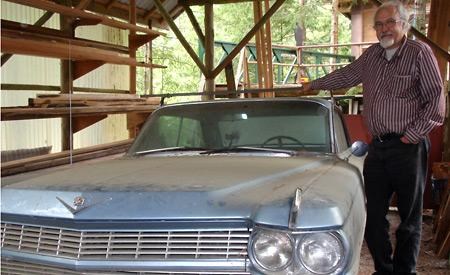If it wasn’t a private residence, Dick Fahlman’s house near Gillies Bay on Texada Island could well be an entertainment industry museum. Bits and pieces from well-known movies and TV shows are everywhere, collected after a lifelong career “behind the scenes” as a show business techie.
Whether it was props, sets, lights, sound or special effects, Fahlman, 66, did it all in films, television, concerts and live theatre. Based in Vancouver, he worked at venues including the Queen Elizabeth Theatre, the Arts Club, the Orpheum, Pacific Coliseum, BC Place, Freddy Wood Theatre at the University of British Columbia, Expo Theatre, and hundreds of film locations, mostly in BC.
He turned a modern day downtown Vancouver back alley into Buenos Aires in the 1930s, built a stone cottage out of styrofoam in Ashcroft to be in the highlands of Bolivia, turned Victoria’s Market Square into Portland, Oregon in 1900, worked at concerts including the Rolling Stones, Rod Stewart, the Pretenders, Fleetwood Mac and Liberace. He did so many episodes of Sesame Street when the troupe performed in Vancouver that he learned the Cookie Monster breakfast song by heart. As an amateur singer, he regaled friends for years with it. Along the way, he managed to have lunch with Jodie Foster, dinner with Harry Belafonte, watch fireworks with Lena Horne and get to know Robert Redford, who Fahlman describes as “a really nice guy.”
By his estimate, he worked 350 theatrical performances, 100 operas, another 100 ballets, 30-plus road shows, 90 ice shows, 100 Pacific National Exhibition events, 12 telethons, 30 feature films, hundreds of concerts, numerous trade shows and many hundred TV episodes and commercials.
Born and raised in Vancouver, Fahlman’s career kicked off in grade three when he did sound effects for a class performance of Cinderella. He studied animation after high school and through childhood friend Wayne Robson, who became a stage actor, he landed a part-time job in 1968 at the Arts Club running a slide projector. He moved on to larger and more complex venues, building and painting sets and doing lighting and effects.
“I always knew I wanted to be a techie,” Fahlman said. “There were so many opportunities to be creative and not do the same thing day after day.” In 1979, he became a member of the International Alliance of Theatrical and Stage Employees (IATSE) Local 891, which put him on the official roster for “call-outs” for work. “There were never any guarantees of work, however. Call-outs could last from a few days to three-and-a-half years, as one of mine did for 21 Jump Street.”
While Fahlman’s career progressed, his family bought four building lots on Texada, where brother Dan Fahlman dug holes for power poles as a summer job in 1956. Two were sold since then and the brothers occupy homes they built on the other two. Fahlman and his wife Catherine Giesbrecht, who grew up on Texada, retired to the island in 2010 in the house he spent the last 40 years adding to.
The mainstay of Fahlman’s work was building sets “which can be a lot more difficult than building the same thing for real life,” he said. “For example, windows have to swivel horizontally and vertically to change their angles so they don’t reflect the lighting.” When work with a set was over Fahlman said it’s usually dismantled and scrapped because set designers are reluctant to use recycled materials. As the person often doing the dismantling, he retained some items and built them into his house, which he describes as “anything but conventional.”
In the carport is a 1964 Caribbean blue four-door hardtop Cadillac Fleetwood from The Big Bully, starring Rick Moranis and Tom Arnold. His greenhouse windows are from three films, Scary Movie 3, Arctic Blue and Nightmare Cafe, while his porch windows are from The Changeling.
An interior staircase is from the set of a stage production of Tartuffe, while two cabinets come from stage sets of The Wild Duck and Playboy of the Western World. Near his kitchen hangs a sign reading “Booth Service” from the TV series Nightmare Cafe. The solarium floor is from a Burton Cummings TV special. Mirrors on his shed wall are from the film The Company You Keep, while his emergency outhouse is the ticket booth from the TV movie Omen IV - The Awakening. His workshop walls are from the TV movie Element of Risk, while the bedroom is panelled with walls from the TV series Palace Guard. His favourite keepsake is three framed panels of autographs from Expo Theatre at Vancouver’s Expo 86 (World Exposition on Transportation and Communication).



